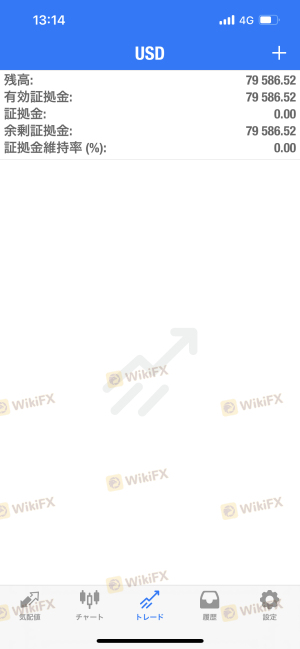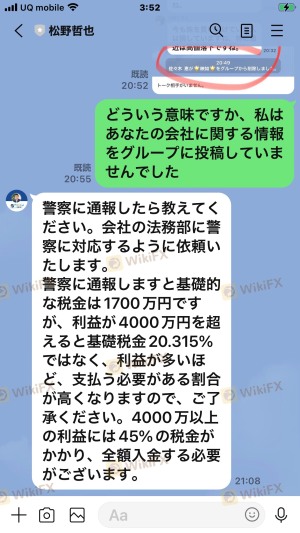Is CFA safe?

Pros
Cons
Is CFA A Scam?
Introduction
CFA, or Capital Financial Advisers, is a forex broker that has emerged in the trading landscape since its establishment in 2020. Operating primarily in the United States and catering to the Japanese market, CFA positions itself as a platform for forex trading, utilizing the popular MetaTrader 4 (MT4) software. However, the forex trading environment is fraught with risks, making it imperative for traders to carefully assess the credibility of brokers before committing their funds. The potential for scams and fraudulent activities in this sector necessitates a thorough investigation into a broker's regulatory status, company background, trading conditions, and overall reputation. This article aims to provide an objective evaluation of CFA, utilizing a comprehensive framework that includes regulatory analysis, company history, trading conditions, and customer feedback to determine if CFA is indeed a safe trading option or if it presents risks to traders.
Regulation and Legitimacy
The regulatory status of a broker is crucial in determining its legitimacy and safety for traders. A well-regulated broker is more likely to adhere to industry standards and protect clients' interests. In the case of CFA, it claims to be regulated by the National Futures Association (NFA), which is a reputable regulatory body in the United States. However, the broker's actual regulatory status raises concerns, as several reviews indicate that it may not be fully authorized to operate.
| Regulatory Body | License Number | Regulatory Area | Verification Status |
|---|---|---|---|
| NFA | 0555675 | United States | Suspicious |
The lack of clear and accessible regulatory information about CFA is alarming. While the NFA is known for its stringent oversight, the absence of negative regulatory disclosures does not guarantee that CFA operates without issues. Moreover, the low score of 1.73 on WikiFX, a platform that evaluates brokers based on user feedback and regulatory compliance, indicates significant concerns. Traders should be cautious, as operating without proper regulation can expose them to higher risks, including potential loss of funds and lack of recourse in disputes.
Company Background Investigation
CFA was founded in 2020, making it a relatively new player in the forex market. A thorough examination of its history reveals limited information about its ownership structure and management team, which raises questions about transparency. The lack of a well-documented company history can be a red flag for potential investors, as established brokers typically provide clear details about their founding, ownership, and operational history.
The management team's background is equally important in assessing the broker's credibility. A team with extensive experience in finance and trading can contribute positively to a broker's reputation. However, CFA's website does not provide sufficient information about its management, which can lead to uncertainty regarding the broker's operational integrity. Transparency in information disclosure is essential for building trust with clients, and the absence of such information may suggest that CFA is not as reliable as it claims to be.
Trading Conditions Analysis
Understanding the trading conditions offered by a broker is vital for traders looking to maximize their investment potential. CFA claims to offer competitive trading conditions, including a low minimum deposit requirement and no fees for account-related activities. However, a closer look at its fee structure reveals some concerning aspects.
| Fee Type | CFA | Industry Average |
|---|---|---|
| Major Currency Pair Spread | Not Disclosed | Varies by Broker |
| Commission Structure | None | Varies by Broker |
| Overnight Interest Range | Not Disclosed | Varies by Broker |
While the absence of commissions and fees may seem attractive, the lack of transparency regarding spreads and overnight interest rates can be problematic. Traders should be wary of brokers that do not clearly disclose their fee structures, as hidden fees can significantly impact trading profitability. Moreover, the ambiguity surrounding the trading conditions may suggest that CFA is not fully committed to providing a transparent trading environment.
Client Fund Safety
The safety of client funds is a paramount concern for any trader. CFA claims to implement various measures to protect client funds, including segregated accounts and investor protection policies. However, the effectiveness of these measures is questionable given the broker's unregulated status.
Traders should inquire about the specifics of fund protection policies, including whether client funds are held in segregated accounts that are separate from the broker's operational funds. Additionally, the lack of information on any past incidents involving fund safety raises concerns. A broker's history of handling client funds and addressing any security issues is a critical factor in determining its reliability.
Customer Experience and Complaints
Customer feedback is a valuable source of information when assessing a broker's performance. An analysis of reviews and complaints regarding CFA reveals a pattern of dissatisfaction among users. Many complaints center around issues such as account freezing, delayed withdrawals, and inadequate customer support.
| Complaint Type | Severity Level | Company Response |
|---|---|---|
| Account Frozen | High | Unresponsive |
| Withdrawal Delays | High | Unresolved |
For instance, several users reported that their accounts were frozen without explanation when attempting to withdraw funds, leading to frustration and distrust. The company's lack of responsiveness to these complaints further exacerbates the situation, making it difficult for traders to feel secure in their dealings with CFA. These patterns of complaints indicate that CFA may not provide the level of service and support that traders expect and deserve.
Platform and Execution
The trading platform is a critical component of the trading experience. CFA utilizes the MT4 platform, which is known for its user-friendly interface and robust features. However, the platform's performance and stability are essential factors that can impact trading success.
Traders have expressed mixed feelings about the execution quality on CFA's platform, with some reporting issues related to slippage and order rejections. A high rate of slippage can erode profits and lead to unexpected losses, while frequent order rejections can hinder trading strategies. It is crucial for traders to evaluate the platform's reliability and execution speed to ensure a smooth trading experience.
Risk Assessment
Using CFA as a trading platform entails several risks that traders should consider. The combination of unregulated status, customer complaints, and unclear trading conditions creates a challenging environment for potential investors.
| Risk Category | Risk Level | Brief Explanation |
|---|---|---|
| Regulatory Risk | High | Lack of proper regulation increases exposure. |
| Financial Risk | Medium | Possible hidden fees and unclear trading conditions. |
| Operational Risk | High | Complaints of account issues and poor customer support. |
To mitigate these risks, traders should conduct thorough research before committing funds to CFA. Seeking alternative, well-regulated brokers with transparent fee structures and positive customer feedback can help ensure a safer trading experience.
Conclusion and Recommendations
In conclusion, the evidence suggests that CFA may present several risks for traders. The lack of clear regulatory oversight, coupled with a history of customer complaints and inadequate transparency, raises concerns about the broker's reliability. While CFA may offer appealing trading conditions, the potential for issues related to fund safety and customer service cannot be overlooked.
Traders should exercise caution and consider alternative brokers with established regulatory frameworks and positive reputations. Brokers that are fully regulated and have a history of positive customer experiences are more likely to provide a secure trading environment. Therefore, it is crucial for traders to prioritize safety and reliability when selecting a forex broker, as the risks associated with unregulated entities can lead to significant financial losses.
Is CFA a scam, or is it legit?
The latest exposure and evaluation content of CFA brokers.




CFA Similar Brokers Safe
Whether it is a legitimate broker to see if the market is regulated; start investing in Forex App whether it is safe or a scam, check whether there is a license.
CFA latest industry rating score is 1.52, the higher the score the safer it is out of 10, the more regulatory licenses the more legitimate it is. 1.52 If the score is too low, there is a risk of being scammed, please pay attention to the choice to avoid.
